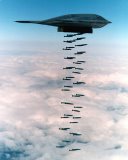Bombing Iran?

The story going round the world media this morning is the report in the Sunday Telegraph of London that the US are planning air and missile strikes against different Iranian nuclear installations.
In itself this is neither new nor sensational. It's hardly a secret inside the Washington beltway that this is something that one has looked very seriously at. Neither is it a secret that it is a military option with so many problems that most people have backed away from it.
But it might still be that things are starting to change somewhat. There is the risk that one at some time will be in a situation where there is seen to be no other alternative. Firm talk would have taken all other options away.
And perhaps this has given somewhat new impetus to the military plans.
The Sunday Telegraph speculates about an attack using long-range B2 bombers from their base close to Kansas City in central US as well as conventionally-armed D5 ballistic missiles launched from Trident submarines.
Perhaps.
The B2 option is there today. Aircrafts are also based at Diego Garcia in the Indian Ocean, which is considerably closer, reducing flight times. But the conventional D5 option might not be available until after the Bush presidency. It's a new weapon system with a number of grave implications that haven't really been discussed.
But the key problem aren't really military. A raid could be done - although it will require full use of the most advanced resources available - as well as some still on the drawing board.
The key problem is what happens afterwards. The United States will be at war with Iran, and Iran is likely to do whatever it can to strike back. This is more likely to happen in Baghdad and Kabul than in New York or Washington, as well as the Straits of Hormuz.
And the Iranian leadership is most unlikely to give up their nuclear ambitions if attacked. On the contrary. An option for them would then be to just buy a weapon and two from North Korea and use them in retaliation against US-related interest in the part of the region that they can reach.
It's a horrible scenario whichever way you look at it.
It's not the attack - it's what happens afterwards.



<< Home